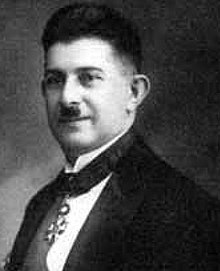Subhi Bey Barakat
Subhi Bey Barakat al-Khalidi | |
|---|---|
صبحي بك بركات الخالدي | |
 | |
| President of the Syrian Federation and the State of Syria under the French Mandate | |
| In office 29[1] June 1922 – 21 December 1925 | |
| Preceded by | Faisal I (As King of Syria) |
| Succeeded by | Ahmad Nami |
| Personal details | |
| Born | Suphi Bereket[2] 1889 Antakya, Ottoman Empire |
| Died | 1939 (aged 49–50) Antakya, Turkey |
| Political party | Independent |
Subhi Bey Barakat al-Khalidi or Suphi Bereket (Arabic: صبحي بك بركات الخالدي Turkish: Suphi Bereket; 1889, Antioch – 1939, Turkey) was a Syrian politician from Antakya,[3] born into a family of Turkish origin.[4] During the French Mandate of Syria, he was the president of the Syrian Federation from 29[5] June 1922 (the day following its creation) to 31 December 1924 and the State of Syria from 1 January 1925 to 21 December 1925).[3]
Part of the reason the French supported his candidacy as president of the Syrian Federation was because as neither a native of Damascus nor a very strong Arabic speaker (Turkish was his mother tongue), he did not seem to pose a nationalist threat to French rule.[6]
Initially he was a partner of Ibrahim Hanano in his revolt. He played a major role in merging the States of Aleppo and Damascus into one state,[citation needed] and he quit the presidency of Syria in 1925 in protest to the French position regarding the fate of the Alawite and Druze States,[citation needed] which France refused to add to Syria because it feared that might endanger the independence of the newly created Lebanon.
Personal life
Barakat was married to Halide; their daughter Süheyla Mukbile married Turkish politician Refik Koraltan and Zehra married Turkish politician Vahit Melih Halefoğlu.[7][2]
See also
References
- ^ [1]; [2].
- ^ a b Cıvaoğlu, Güneri (2016). "Aile ağacında DNA". Milliyet. Retrieved 18 December 2016.
- ^ a b Moubayed, Sami M. (2006). Steel & silk: men and women who shaped Syria 1900-2000. Bridge between the cultures series. Cune Press. pp. 200–202. ISBN 978-1-885942-40-1. Retrieved February 2012.
{{cite book}}: Check date values in:|accessdate=(help) - ^ Bidwell, Robin (1998), "Barakat, Subhi (c.1886-)", Dictionary Of Modern Arab History, Routledge, p. 68, ISBN 1136162917,
BARAKAT, Subhi (c. 1886-) Syrian Head of State. He was born into a Turkish family in Antioch and was educated in the local secondary school.
- ^ Arrêtés Nos. 1, 2 & 3, Bulletin hebdomadaire des actes administratifs du Haut-Commissariat (8 October 1922), p. 268; [3].
- ^ Khoury, Philip (1987). Syria and the French Mandate: the Politics of Arab Nationalism, 1920-1945. Princeton, N.J.: Princeton University Press. p. 127.
- ^ "Vefat: Oğuzhan Koraltan". Hurriyet. Retrieved 18 December 2016.




